==================
A Caveat and Affiliates
First off, a little caveat: within my articles you will find affiliate links, meaning if you buy them, I get a small commission. Your cost is not affected. In addition, I am an Amazon Associate and I earn from qualifying purchases on Amazon.
And yes, if I say that I recommend a product here, it means I truly believe it is a good product. I refuse to recommend any product that I have not researched and believe to be a good value.
Even better, I provide you with a very clear picture of the product, it’s use, and the probable value.
Earning your trust is important to me. I run this website myself and the commissions and donations help support the site.
Sound reasonable and fair enough? Let’s continue to the article.
==================
Contents
Thyme Tea for Cough Relief: Natural Remedies at Home
Thyme tea, treasured for its culinary uses, also holds a place in traditional herbal medicine for its potential to soothe a cough. Extracted from the Thymus vulgaris plant leaves, thyme is rich in compounds like thymol, which is believed to have antimicrobial and anti-inflammatory properties. This makes thyme tea a natural remedy that people often turn to when seeking relief from respiratory conditions like bronchitis or a common cough.
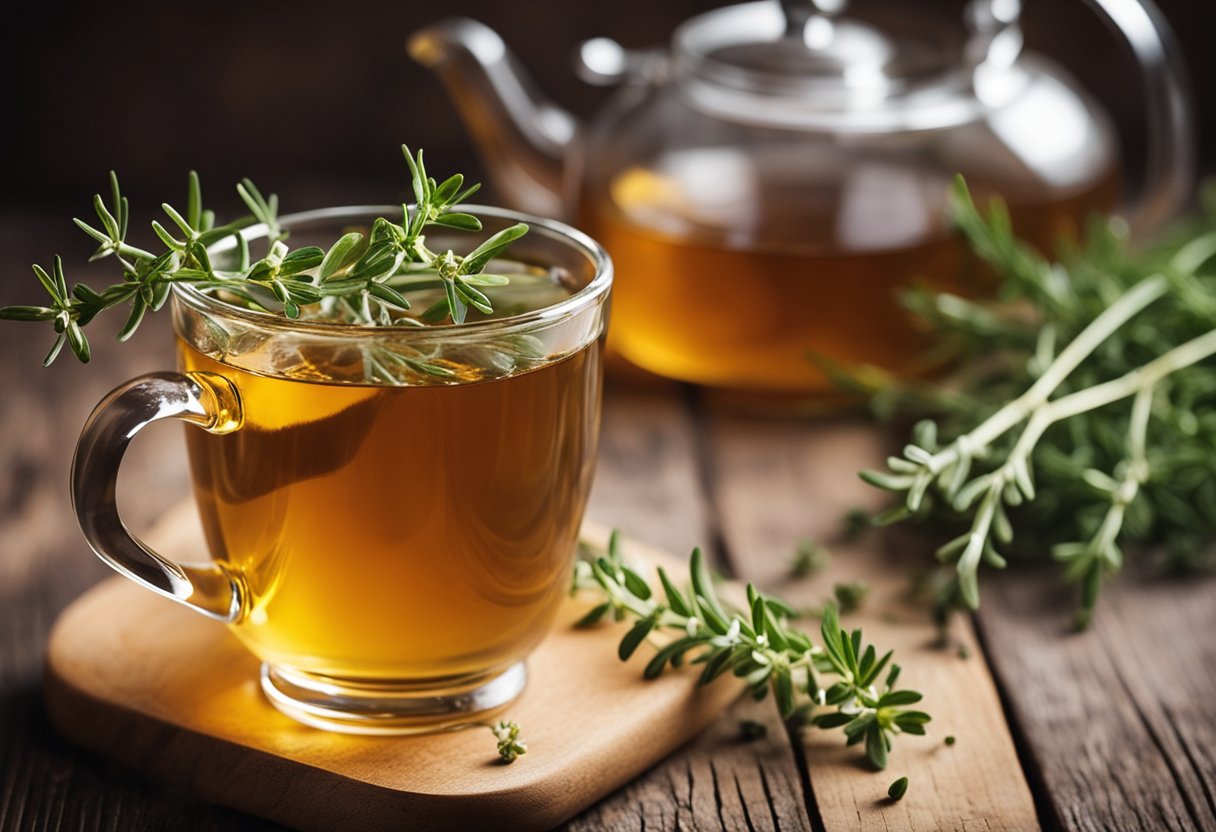
The practice of consuming thyme tea for coughs aligns with the notion of using natural herbs to support health and wellness. As individuals look for alternatives to over-the-counter medications, the interest in home remedies such as thyme tea has seen a resurgence. Brewing a cup of thyme tea is straightforward, requiring just fresh or dried thyme and hot water, and it can be easily integrated into one’s daily routine.
Research investigating the effectiveness of thyme tea in relieving cough symptoms suggests it may help relax the tracheal muscles and alleviate inflammation, providing comfort to those suffering. While it should not replace medical treatment when needed, thyme tea serves as a complementary approach for managing mild coughs at home. It’s important, however, for individuals to consult with healthcare professionals before relying solely on herbal remedies, especially when dealing with persistent or severe symptoms.
Understanding Thyme Tea
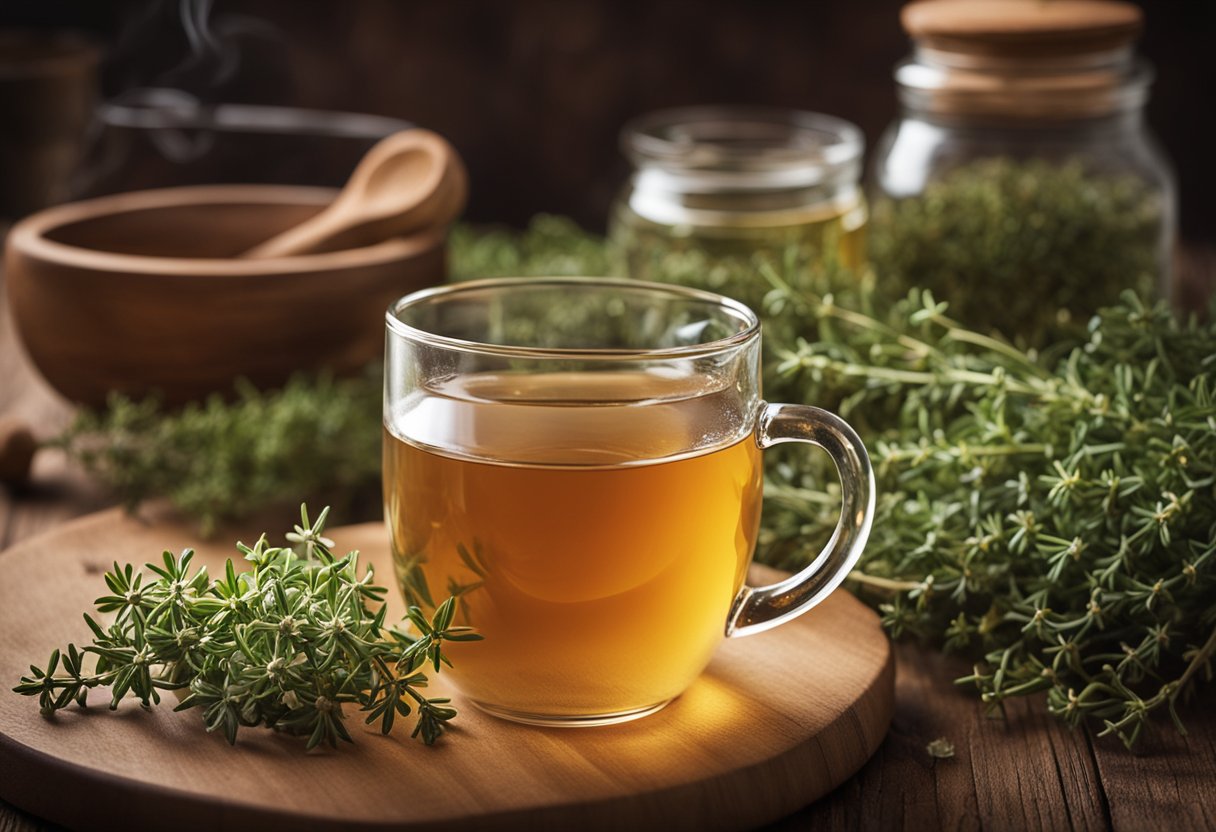
Historically used for respiratory ailments, thyme tea contains various compounds that contribute to its potential therapeutic effects.
Historical Background
Thyme has been utilized since ancient times, with evidence of its medicinal use dating back to the Egyptians and ancient Greeks. They employed it for its preservative qualities as well as for its therapeutic benefits. Its reputation as a remedy for coughing and other respiratory issues has been sustained throughout the centuries.
Components and Properties
Thyme contains several active components that are thought to have medicinal properties. Key constituents include:
- Thymol: The primary volatile oil noted for its antiseptic and antibacterial activities.
- Carvacrol: A compound with antimicrobial properties.
| Component | Properties |
|---|---|
| Flavonoids | Antioxidant effects |
| Tannins | Astringent properties |
| Terpenoids | It may help relieve cough and congestion |
Various laboratory studies suggest that these components provide thyme with its expectorant and cough-suppressant abilities, although more research is needed to understand the extent of these effects in humans fully.
Thyme Tea for Coughs
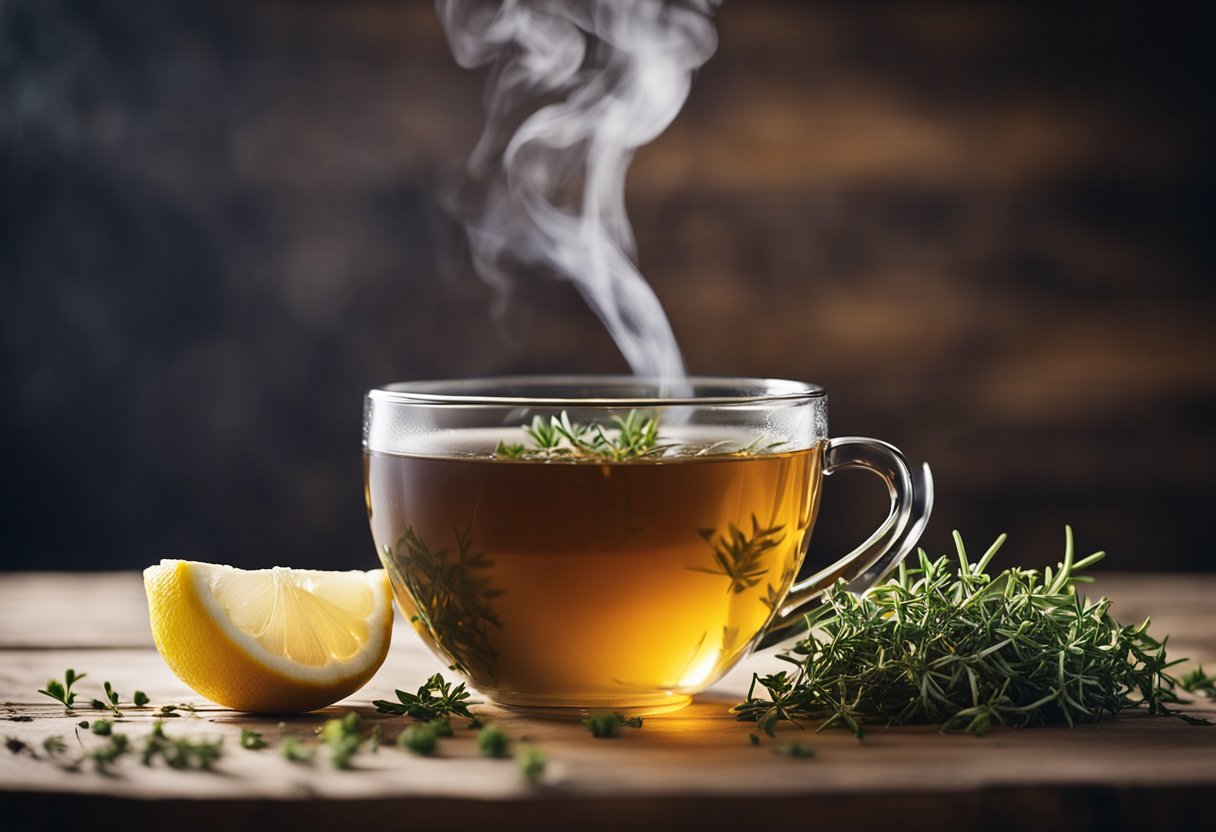
Thyme tea is commonly used as a natural remedy for coughs due to its potential to ease symptoms and support respiratory health through its active compounds.
How Thyme Soothes a Cough
Thyme contains compounds such as thymol and carvacrol, which have antispasmodic properties. Thymol can help reduce coughing fits by relaxing the tracheal and bronchial muscles. Additionally, thyme’s natural expectorant abilities aid in loosening mucus, making it easier to expel.
Scientific Research on Thyme and Respiratory Health
Research investigating thyme’s effects on respiratory health has yielded positive findings. For instance, a clinical study cited in the “Planta Medica” journal shows that an extract of thyme combined with ivy relieved coughing more effectively than a placebo. This suggests that using thyme for coughs has a basis in scientific evidence.
Preparing Thyme Tea
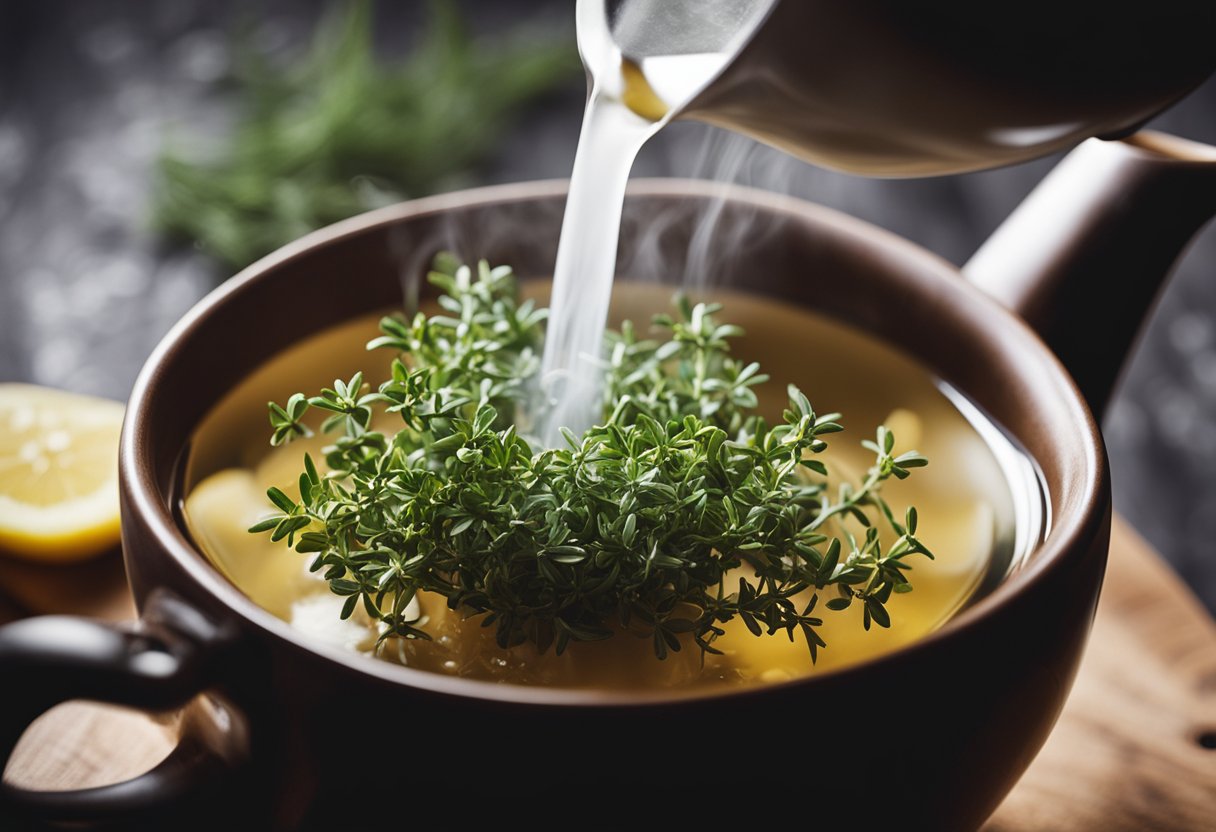
Thyme tea is an herbal infusion known for its potential to soothe coughs. Mastery in selecting the right ingredients and employing proper brewing techniques can yield an aromatic and beneficial cup of tea.
Selecting Ingredients
- Thyme: One must procure fresh or dried thyme. For a stronger infusion, it is recommended to use 2 teaspoons of dried thyme or a small handful of fresh thyme per cup of water.
- Water: Use fresh, cold water for boiling. If tap water has a discernible taste or odor, filtered or bottled water is advisable to ensure the purity of the tea’s flavor.
- Optional Add-ins: One might consider honey or lemon as an addition after brewing to enhance flavor and potential health benefits.
Brewing Techniques
- Boil Water: Begin by bringing water to a boil. For one cup of thyme tea, 8 ounces of water is typically sufficient.
- Add Thyme: Once the water reaches a boil, add your selected amount of thyme.
- Steep: Cover and let the thyme steep for about 5 minutes. A longer steep time will result in a stronger tea but can potentially create a more bitter taste.
- Strain: After steeping, strain the thyme leaves from the water using a fine mesh strainer or a tea infuser.
- Serve: Decant the tea into a cup. For those who prefer, sweeten with honey or add a slice of lemon.
To achieve the best results, one should maintain the appropriate temperature and steeping time to extract the full flavor and benefits of the thyme without over-brewing.
Usage and Dosage
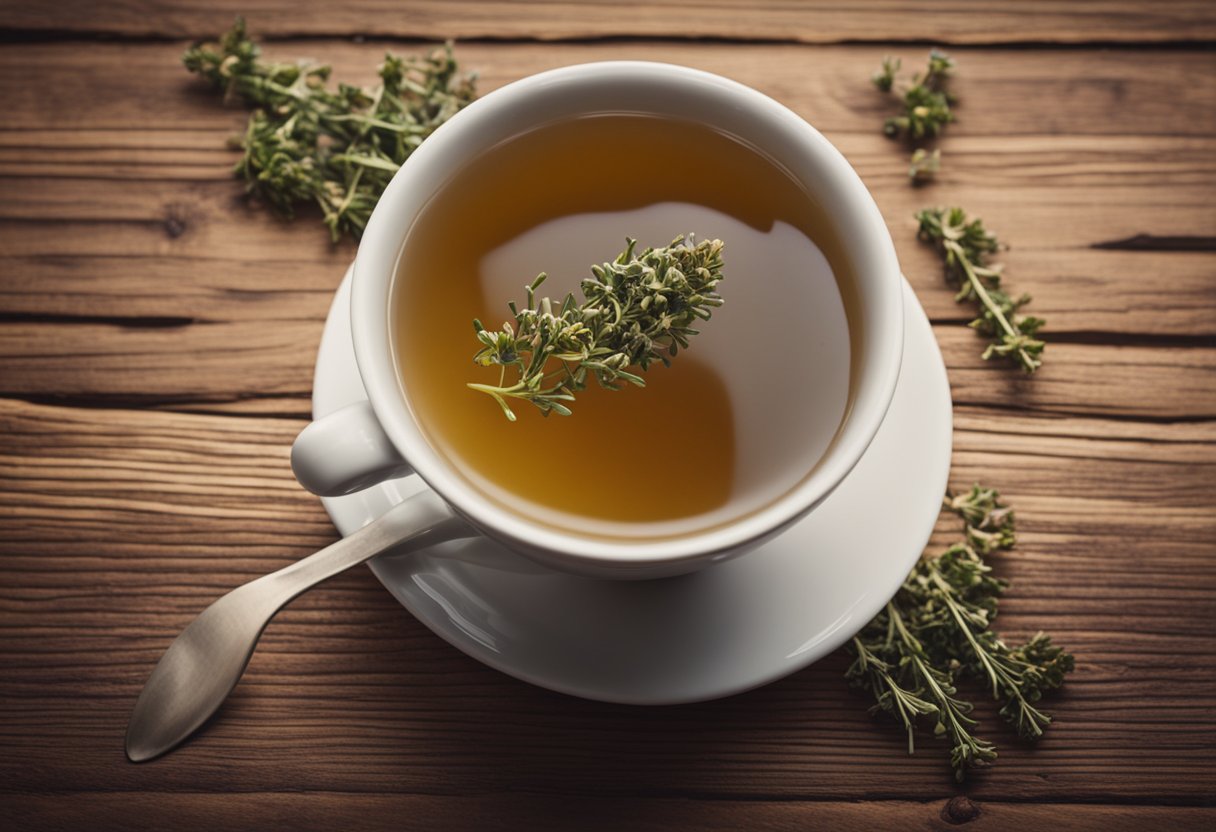
When preparing thyme tea for cough relief, one should follow these suggested guidelines:
- Ingredients:
- 1 tablespoon of dried thyme leaves
- 8 ounces of boiling water
- Preparation steps:
- Place the dried thyme leaves in a teacup or mug.
- Pour the boiling water over the thyme.
- Cover the cup and steep for 10 to 15 minutes.
- Strain the leaves from the liquid before drinking.
- Dosage:
- Adults may consume 1 cup of thyme tea up to three times daily.
- One should consult with a healthcare professional to determine an appropriate dosage for children.
- Duration:
- Thyme tea can be used as a temporary relief measure for coughs. One should consult a healthcare professional if symptoms persist beyond a few days.
Additional Notes:
- One may add honey or lemon to the tea for taste and additional benefits.
- Individuals with allergies to herbs in the Lamiaceae family should avoid thyme tea.
Remember, while thyme tea is traditionally used to alleviate coughs, it should not replace medical treatment if needed. Always monitor the body’s response to herbal remedies and seek professional advice if there are concerns.
Safety and Side Effects
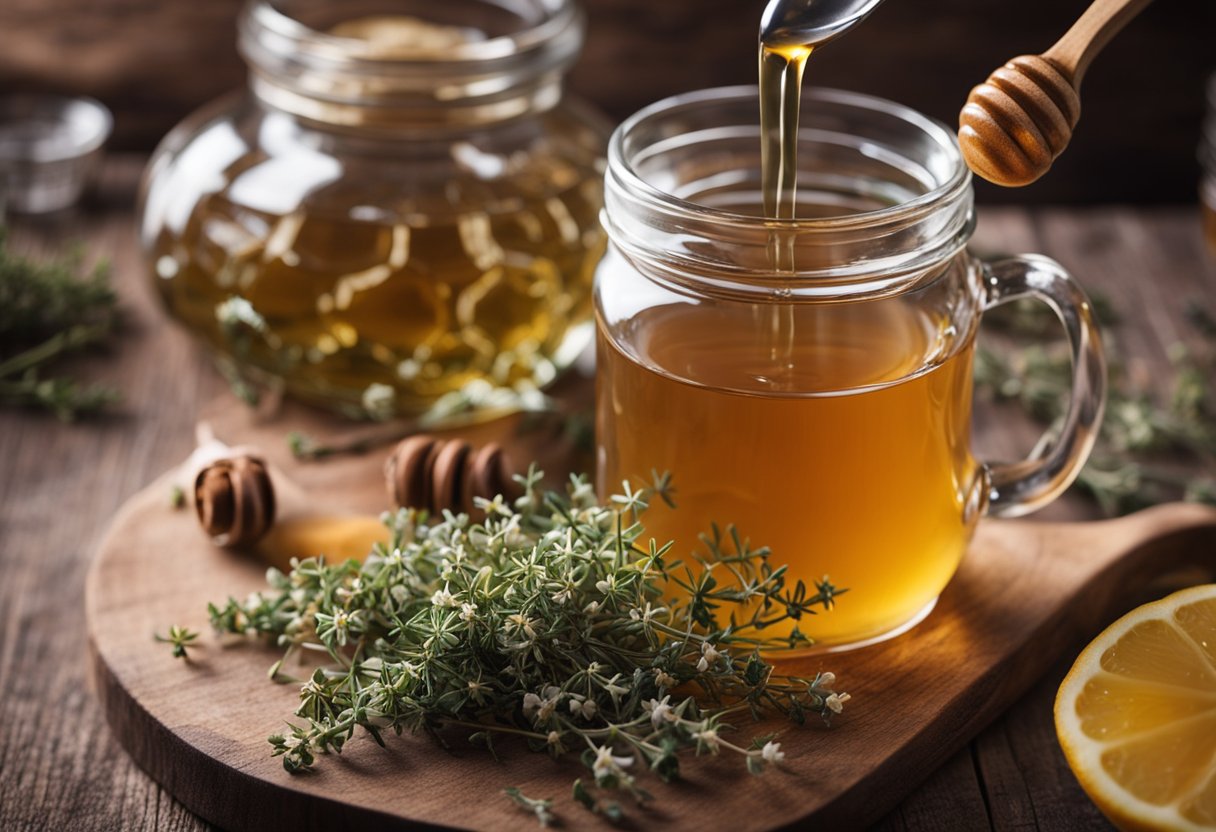
While thyme tea is generally considered safe when consumed in typical food amounts, individuals should be aware of possible side effects and interactions, especially when consumed in medicinal amounts or by those with certain health conditions.
Possible Interactions
- Medications: Thyme tea may interact with medications such as anticoagulants and nonsteroidal anti-inflammatory drugs (NSAIDs), impacting their effectiveness.
- Health Conditions: Individuals with bleeding disorders may experience an increased risk of bleeding due to thyme’s possible anticoagulant effects.
Contraindications and Cautions
- Pregnancy: Pregnant women should avoid high doses of thyme tea as it may stimulate the uterus.
- Allergies: Those allergic to Lamiaceae family plants (oregano, mint) might also react to thyme.
Alternative Remedies for Cough
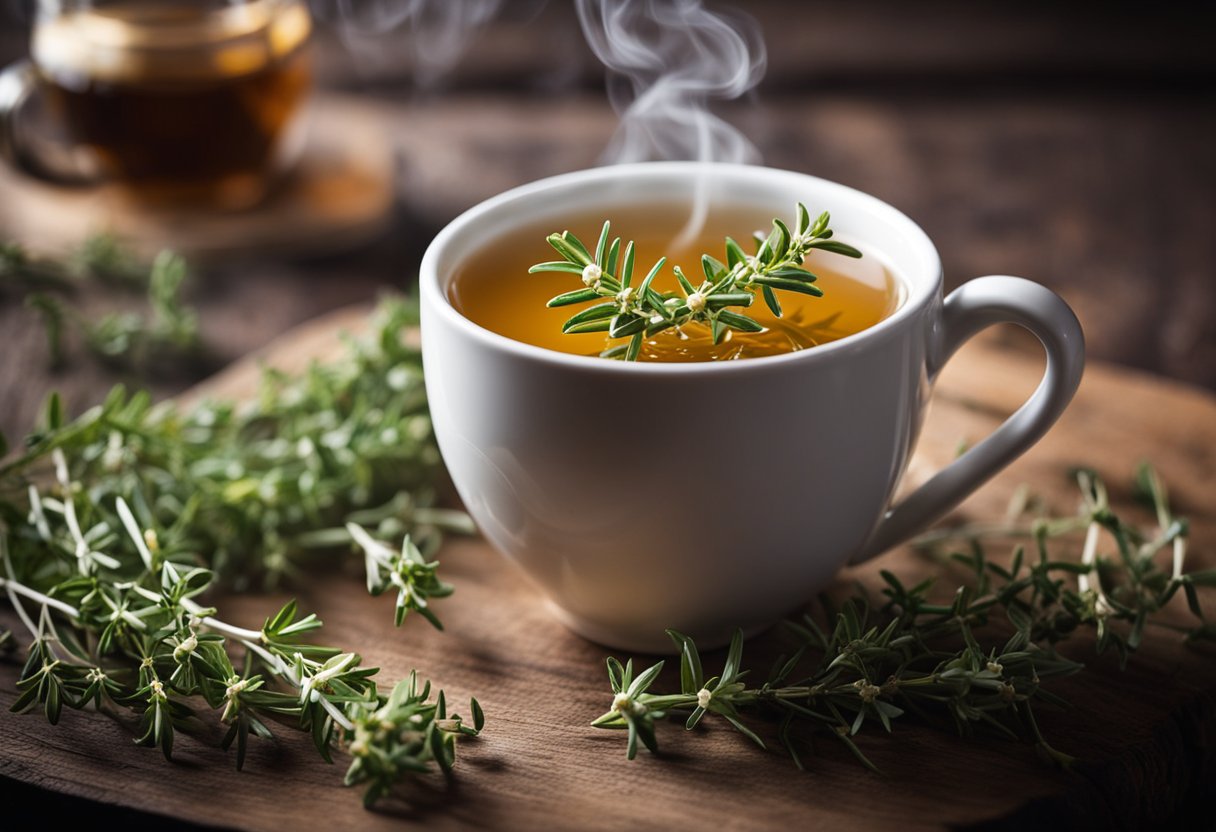
When addressing a cough, several natural options can be considered alongside or sometimes in place of traditional medicine. Honey, particularly in herbal tea or warm water, is well-known for its soothing properties. In fact, its effectiveness has some support from clinical studies.
Herbal Teas, such as licorice root, ginger, and marshmallow root, can offer relief. These herbs may reduce throat irritation and suppress coughing.
Salt Water gargling is a simple yet effective method to relieve a cough. Gargling with warm salt water can help soothe the throat and clear mucus.
Here’s a brief overview of potential remedies:
- Honey: Mix with warm water or tea to soothe the throat.
- Herbal Teas: Drink teas made with cough-suppressing herbs.
- Salt Water Gargle: Helps reduce throat irritation.
Humidifiers and Steam
Additionally, maintaining moisture in the air with a Humidifier or inhaling Steam can aid in loosening mucus in the airways, making coughs more productive and lessening the urge to cough.
Essential Oils
Some people find relief by using Essential Oils, such as eucalyptus or peppermint oil. When diluted with a carrier oil, these can be used in a diffuser or applied topically.
Remember, alternative remedies might not work for everyone and should not replace medical treatment when needed. It is advisable to consult a healthcare professional before trying new remedies, especially for persistent or severe coughs.
Testimonials and User Experiences
Individuals who have tried thyme tea for easing a cough often share positive feedback. Linda M. reports, “After drinking thyme tea, I noticed a significant reduction in my cough frequency. It didn’t eliminate my cough but made it more manageable.”
A regular thyme tea drinker, Jim S., states, “Thyme tea has a soothing effect. It’s become a part of my evening routine whenever I feel a cold coming on.”
| User | Experience |
|---|---|
| Susan T. | I noticed immediate soothing of the throat |
| Rick B. | I felt relief after a few days of consistent use. |
Community forums discuss recipes for thyme tea, often suggesting the addition of honey for its potential soothing properties. Emma K. says, “Adding honey to my thyme tea doubled the relief I felt.”
Health bloggers who recommend natural remedies frequently include anecdotes about thyme tea. For instance, Natural Ways Blog shares, “Many readers have reported that thyme tea helps reduce the intensity and duration of their cough.”
Despite the generally positive experiences, it is important to consult with a healthcare provider before trying new treatments, as individual results may vary.
More From Tea Jubilee
And that’s all for today! We hope you enjoyed reading about our recipe for thyme tea! Stop back soon for more.




